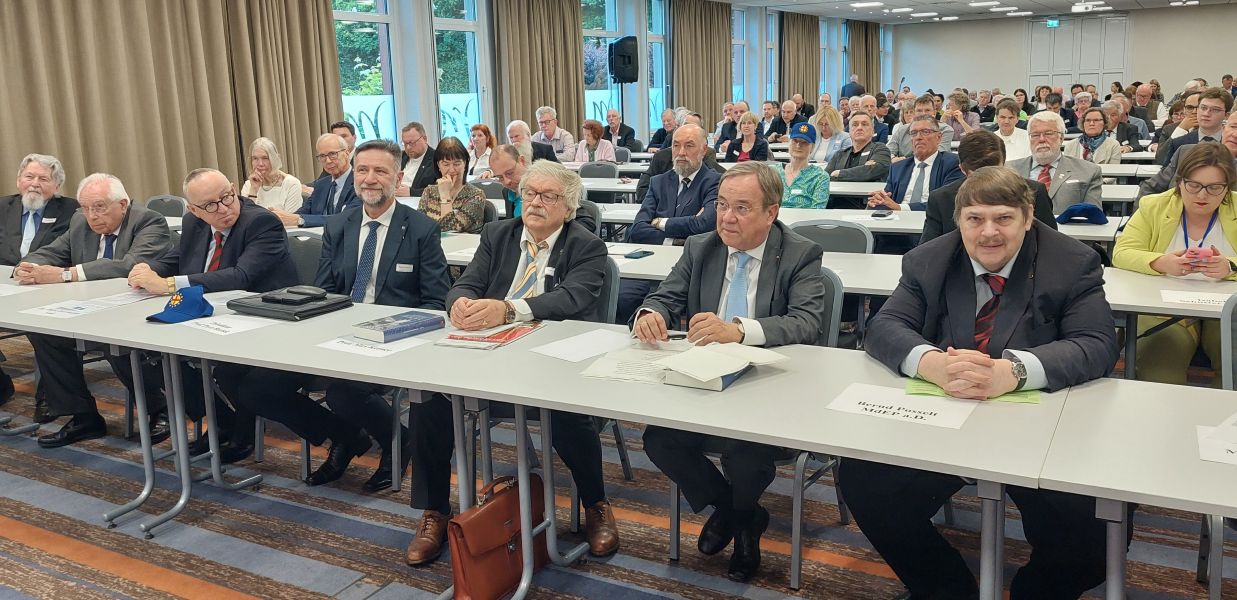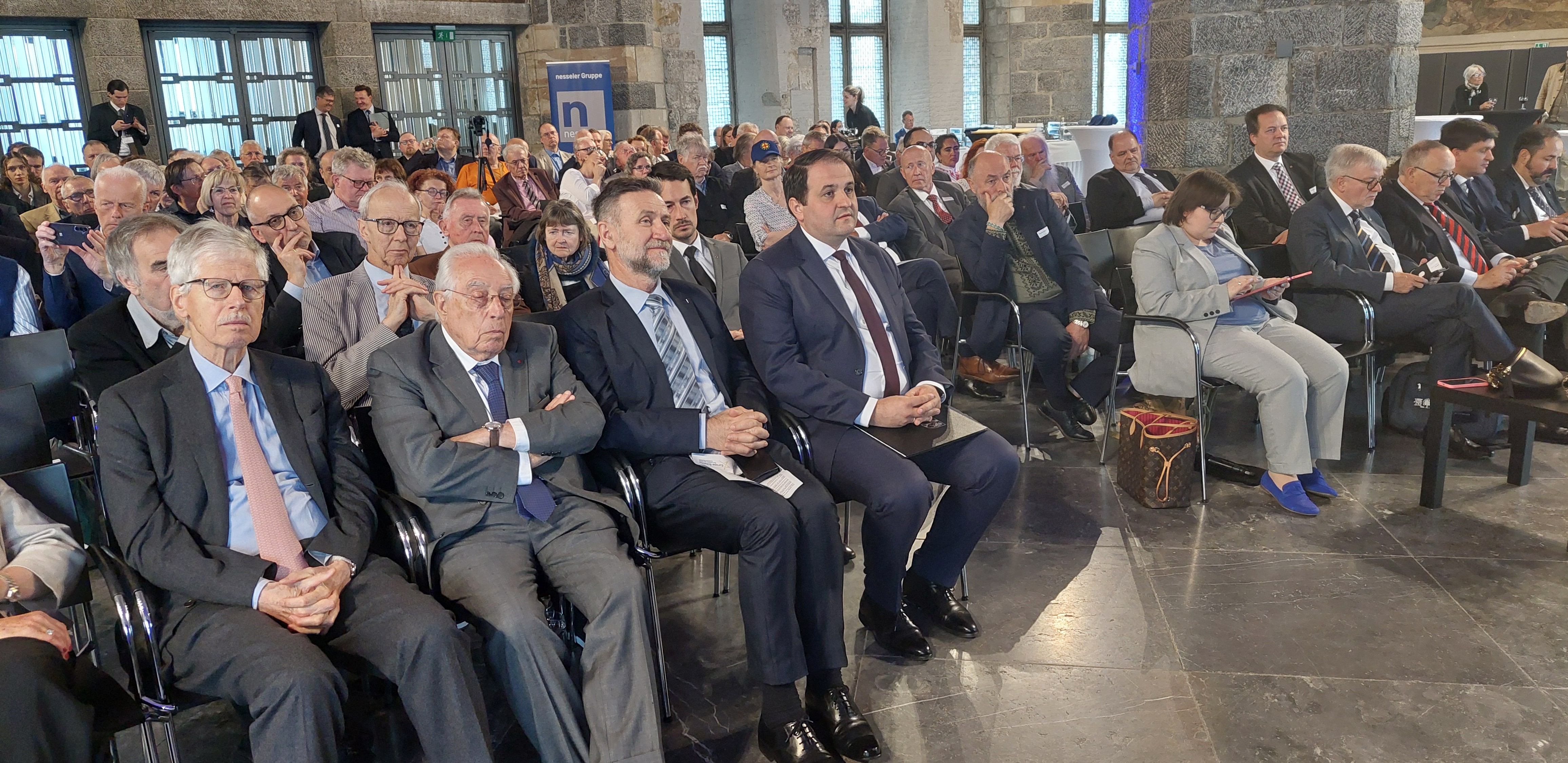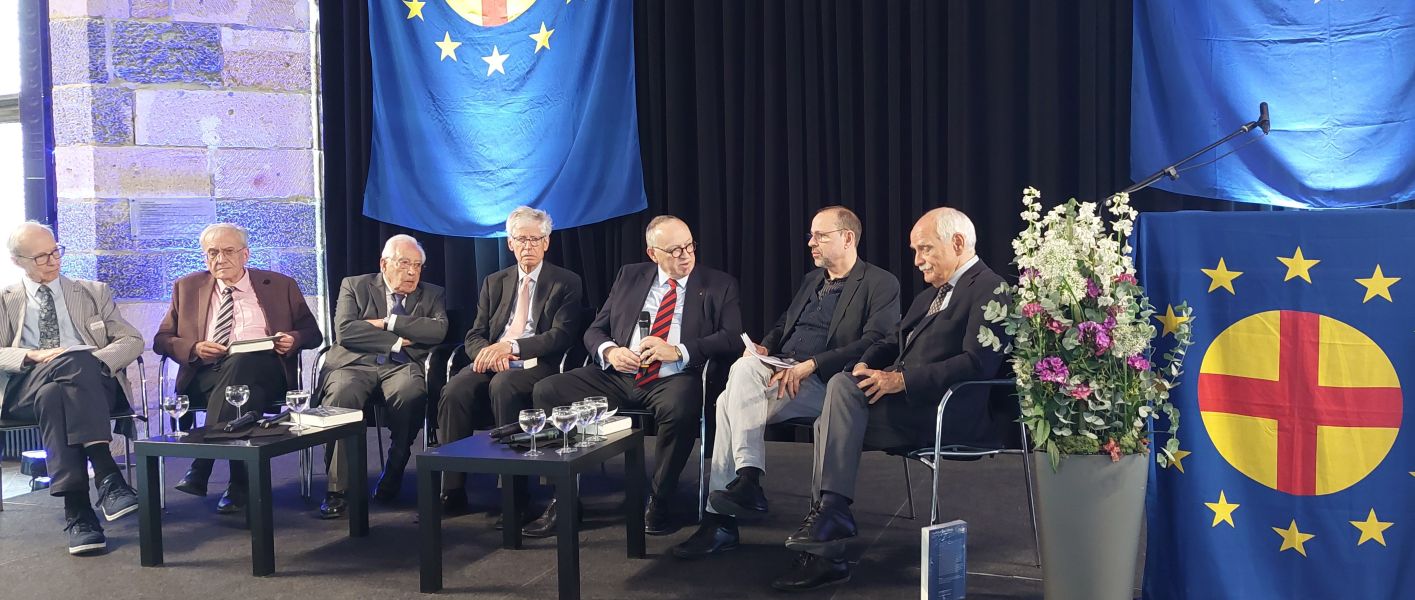Pan-Europe - From a Vision to a Question of Existence
The 51st Pan-Europa Days were organised by the Pan-European Union Germany in partnership with the Charlemagne Prize Foundation in Aachen from 16 to 18 May 2025 - to mark the 75th anniversary of the highest European award, which was first presented to the founder of the Pan-European Union, Richard Coudenhove-Kalergi, on 18 May 1950. The congress was attended by guests from 21 countries.
The further development of the EU into a United States of Europe with a common foreign and defence policy was a recurring theme throughout the speeches. The main topics were the dramatically changing global political situation and the commemoration of the founder Richard Graf Coudenhove-Kalergi.
At the opening ceremony, PEU Federal Managing Director Johannes Kijas welcomed participants and guests.
The regional chairman of the Paneuropa-Union North Rhine-Westphalia, Karl Alexander Mandl, thanked Armin Laschet for his commitment to Franco-German relations and noted with hope the visits of the new Federal Chancellor Merz to Paris and Warsaw.
A welcoming address in excellent German by Ulysse Gounelle, Deputy Chairman of Pan-European Youth France, was greeted with applause.
International President Pavo Barišić emphasised that ‘no political movement of the 20th century can match the moral strength and enduring appeal of the Pan-European idea.’ Nationalism, fascism, National Socialism and communism were ‘destructive forces’. They had all failed, but ‘a dangerous relapse’ was looming. Putin embodies ‘the return of Great Russian imperialism, cloaked in the claim that he is defending himself against a “decadent West”.’ Pan-Europe stands ‘for the exact opposite: not for subjugation, but for voluntarism; not for domination, but for partnership; not for violence, but for mutual respect.’ In terms of foreign policy, decades of certainties "are being shaken, and an uncomfortable truth is emerging: The USA's nuclear defence shield can no longer be taken for granted. Europe must learn to stand up for itself - also in matters of security." With regard to the upcoming EU enlargements, Barišić said that these were ‘not an act of mercy, but strategically necessary, politically necessary and morally just.’
The designated Chairman of the Foreign Affairs Committee in the German Bundestag, Armin Laschet, called for the rapid establishment of a European Defence Union. Although the creation of a European pillar of NATO, which is urgently needed in view of the current global political situation, could go beyond the EU structures through partnerships with countries such as the UK, Laschet warned against bypassing the Europe of institutions. This must be strengthened, above all by eliminating the principle of unanimity in the Council of Ministers. He called the forthcoming award of the Aachen International Charlemagne Prize to Commission President Ursula von der Leyen a ‘political signal’ in favour of the European institutions.
The relic bust from the Aachen Cathedral Treasury presided on the screen over the lecture ‘Visiting Charlemagne’ by Prof Max Kerner from the Historical Institute of RWTH Aachen University.
The President of the Pan-European Union Germany and long-standing Munich MEP Bernd Posselt described the current ‘coalition of the willing’, consisting of a number of nation states, as a ‘necessary mistake’. On the one hand, this loose form of cooperation between states was unavoidable in order to quickly assist Ukraine, especially as the Russian war of aggression was directed against Europe as a whole. Secondly, Europe will only survive in peace and freedom in the long term if it is constituted as a federal state with a common foreign and defence policy on a treaty basis: "EU integration makes the small countries bigger and the big ones smaller. It is therefore more democratic and sustainable than if the big countries simply agree something over the heads of the others and bypass particularly competent states such as the Baltic states or the Czechs."
At the conference in Aachen's Coronation Hall, North Rhine-Westphalia's Minister for Europe, Nathanael Liminski, emphasised that the Pan-European Union, founded in 1922, had always been a ‘corrective to the spirit of the times’ in the face of destructive ideas such as nationalism and totalitarian ideologies. Answers do not only emerge in a crisis, ‘they must be prepared, thought about, cultivated and preserved - this is precisely the historical and current significance of the Pan-European Union.’ Coudenhove-Kalergi and his successor Otto von Habsburg had always been ahead of developments: "Coudenhove spoke of a United States of Europe when Europe was still geography. He knew that it could not be united by force, but by common values, and that it could only preserve its cultural soul if it united."
The First Vice-President of the European Parliament, Sabine Verheyen MEP, warmly welcomed the pan-Europeans to her home town of Aachen, ‘a city that could not be more European’, and ‘to the Coronation Hall, which breathes Europe’. The war in Ukraine ‘has shaken us all to the core, because it shows how fragile the peace we thought was secure in recent decades really is.’ That is why every individual must ‘work for peace and freedom’.
Prof Ihor Zhaloba, President of the very well-membered Pan-European Union Ukraine and member of the Ukrainian Academy of Sciences, who voluntarily fought on the front line for almost three years, described in clear terms the existential threat posed to his country by the Russian war of aggression.
The President of the Pan-European Union of Spain, Prof Carlos Uriarte Sánchez, called for a coherent geopolitical concept from the EU.
At the main rally in the town hall, which was moderated by the Federal Chairwoman of the Pan-European Youth Germany, Isabella Schuster-Ritter, the Mayor of Aachen, Margarethe Schmeer, and the President of the Pan-European Union Belgium, Patrice Vanderbeeken, gave welcoming addresses.
At a symposium in Aachen's Coronation Hall, historian Martin Posselt presented his newly published academic work "A Parliament for Europe. Richard Coudenhove-Kalergi, Pan-Europe and Western Democracy 1922 - 1952", the cover of which shows the awarding of the first Charlemagne Prize in Aachen to this father of democratic Europe. Even in the interwar period, his name stood for Germany's orientation towards the West and for a liberal European order.
In a fascinating keynote speech, the former Lord Mayor of Aachen, Jürgen Linden, outlined the interlinked impact of the first Charlemagne Prize winners - alongside Coudenhove, Alcide de Gasperi, Konrad Adenauer and, as recently as 1958, Robert Schuman, as such an honour would have seemed premature in the eyes of many French people due to the deep wounds caused by the two world wars.
This was followed by a panel discussion chaired by Dirk Voss, International Vice-President of the Paneuropa Union and Director of Paneuropa Publishing.
The international Honorary President of the Pan-European Union, Alain Terrenoire from France, shed light on Coudenhove's life's work, with whom he still worked personally as well as with General de Gaulle, in the light of international politics and drew conclusions for the current geopolitical situation.
Prof Wilfried Loth, one of the most prominent historians of Europe in the German-speaking world, analysed the various currents of European unification efforts, among which Coudenhove stood out, but also triggered controversy.
The President of the European Society Coudenhove-Kalergi in Vienna, Prince Nikolaus von und zu Liechtenstein, inspired the audience with very personal descriptions and assessments of the great European, who not only founded the Pan-European Union, but also headed it for 50 years and, as a private citizen, provided more impetus for European unification than many holders of political office.
The English Coudenhove biographer Martyn Bond juxtaposed the very different European pioneers biographically and in particular pointed out the differences between Coudenhove and Jean Monnet: The former, like the Pan-European Union as a whole, had focussed on the broad, long-term lines, while Monnet had been a man of small steps.
- Programme (DE) (PDF)
- Pressemitteilung (DE) (PDF)



